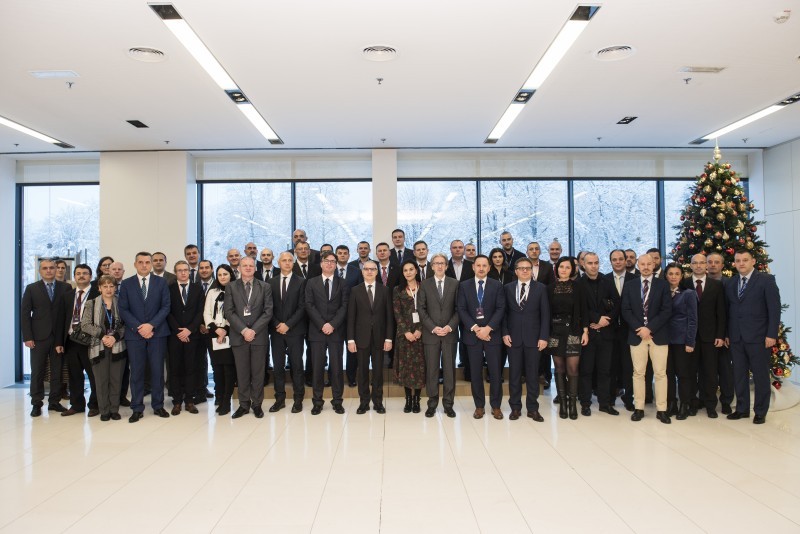- Home/
- News
RCC: Second Regional Coordination Conference for Counter-Terrorism and Prevention and Countering Violent Extremism opens in Brdo pri Kranju

Participants of the Second Regional Coordination Conference for Counter-Terrorism and Prevention and Countering Violent Extremism in South East Europe in Brdo pri Kranju, Slovenia, on 30 November 2017 (Photo: RCC/ Bor Slana)
Svilanovic: Departures from the region to Syria and Iraq almost completely stopped by mid-2016
Brdo near Kranj – Second Regional Coordination Conference for Counter-Terrorism (CT) and Prevention and Countering Violent Extremism (P/CVE) in South East Europe (SEE), discussing the enhancement of cooperation and coordination of CT and P/CVE programmes and activities in the region, commenced in Brdo near Kranj, Slovenia today.
Bostjan Sefic, State Secretary at Ministry of Home Affairs of Slovenia
officially opened the Conference on behalf of the host Ministry, welcoming the
participants and pointing out to the high importance of today’s
Conference as it brought together three different levels of partners:
political, strategic and operational.
He continued to say that safe and stabile region was a significant part of the
global security, adding that Slovenia was investing a lot in regional
cooperation and supporting collaborative approach to combating terrorism,
foreign terrorist fighters and any violent extremism, within the EU but in the
region as well.
Goran Svilanovic, the RCC Secretary General, addressed the participants
reminding them on the conclusions of the first Regional Conference, held in
Tirana, Albania in November 2016, which revolved around pressing issues such as
early addressing of root causes, the role of local communities and creation of
concrete programmes for de-radicalization and reintegration of returnees.
„Our work here is far from over. Terrorism has to be comprehended in order to
be defeated, which goes well beyond government and institutional networks and
presupposes better understanding of certain societal patterns. To that end the
RCC commissioned a study[1], which finds that in the period 2012-2017, some 1000 individuals
from the Western Balkans travelled to Syria and Iraq, about 300 have returned,
more than 200 have been killed, and some 400 remain there, although the pace of
the departure of citizens from this region slowed down in 2015, and almost
completely stopped by mid-2016. At the same time, around 5,000 EU citizens went
to fight in Syria and Iraq”, said Svilanovic concluding that such compelling
data brought us closer to conceiving what should be done, from schools to
prisons, in order to defeat violent ideologies leading to dreadfulness of
terrorism.
Rajko Kozmelj, Chair of Integrative Internal Security Governance (IISG)
reiterated the role of the Western Balkan Counter-Terrorism initiative (WBCTi),
a coordinated and needs-based response to radicalization leading to violent
extremism and terrorism in the Western Balkans, explaining that based on its
work the region has recognised and acted upon several new and useful synergies
in the solutions they offer in filling the gaps in strategic, policy and
operational-level cooperation.
„The WBCTi will thus continue to identify potential new synergies and optimise
the added value of all partners’ investments in order to provide sustainable
and cost-benefit efficient solutions to arrive to functioning
'Prevent–Refer–Address' Mechanism (P-R-A) in each WB beneficiary.“
The Conference boosts mutual understanding of all relevant stakeholders and is
envisaged to result in specific conclusions and recommendations on future
direction of joint CT and P/CVE efforts in SEE that would streamline
cooperation, efficiently engaging region’s limited human and financial
resources.
The participants will also talk about the current trends and challenges,
activities at European, regional, and national level, and the ways of
implementing already agreed “whole of government, whole of society” approach in
P-CVE. The meeting will also hear about the activities and results achieved
since the last Coordination Conference, held in November 2016 in Tirana.
An integral and very important part of the Conference, which is also part of
the Western Balkans Counter- Terrorism Initiative (WBCTi), will be separate
sessions of the three specialized regional formats for CT and P/CVE RCC's SEE
Group of National Focal Points (NFP) for Prevention and Countering Violent
Extremism (NFP Group); Police Cooperation Convention for Southeast Europe (PCC
SEE) CT Network; and the Counter-Terrorism Initiative (CTI) Network.
The NFP Group will make a policy overview of trends in violent extremism and
radicalization leading to terrorism in South East Europe, as well as
programmes, activities, and challenges encountered in prevention and countering
violent extremism (P/CVE) at regional, national, and local levels. The
participants will discuss and agree on guidelines for further action at
regional and national level.
The Conference, organised by the Regional Cooperation Council (RCC) together
with the Slovenian South-East European Cooperation Process (SEECP)
Chairmanship-in-Office, in cooperation with the Western Balkans
Counter-Terrorism Initiative (WBCTi) and the Police Cooperation Convention for
Southeast Europe (PCC SEE), gathers representatives of national governments and
international and regional organisations and initiatives active in the
field.
SUMMARY OF THE STUDY: A Waiting Game: Assessing and Responding to the Threat from Returning Foreign Fighters in the Western Balkans”


 Development of specialized PCVE web site is funded by EU FUNDS CN 2017-386/831 - "IPA II 2016 Regional Action on P/CVE in the Western Balkans"
Development of specialized PCVE web site is funded by EU FUNDS CN 2017-386/831 - "IPA II 2016 Regional Action on P/CVE in the Western Balkans"